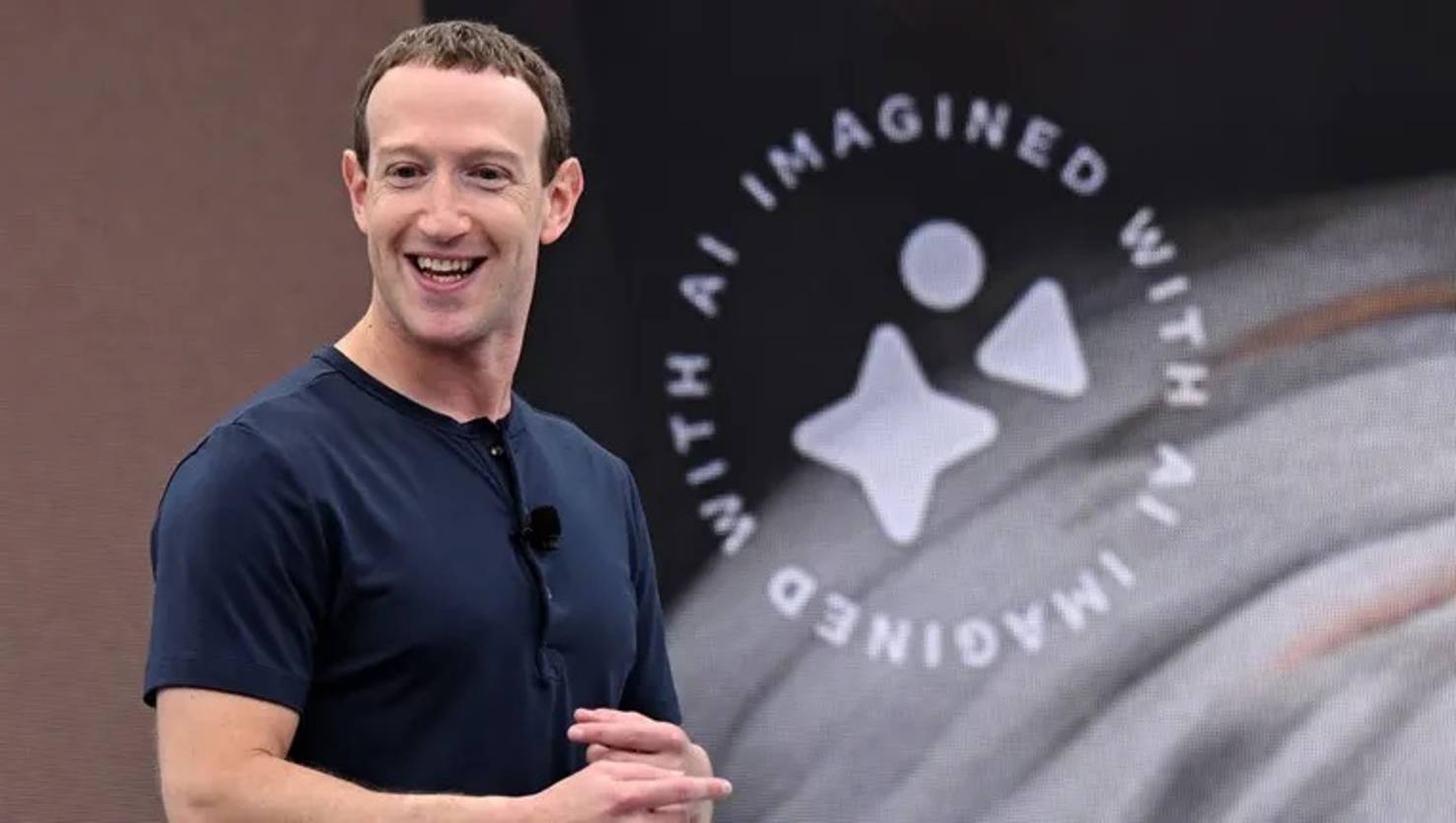Mark Zuckerberg aspires to surpass Elon Musk in embodying the real-life counterpart of Marvel superhero Tony Stark.
Meta’s strategy to surpass its competitors in the field of AI relies heavily on the vast repository of billions of images, posts, and videos willingly provided by users.
In a recent announcement on Thursday, Meta, led by Zuckerberg, disclosed a remarkable financial performance, with profits soaring threefold year-over-year to a staggering $14 billion.
The surge in profitability has been attributed to stringent cost-cutting measures and a notable resurgence in advertising revenue.
Meta’s strategic roadmap involves substantial investments in its virtual reality and artificial intelligence (AI) products.
During an earnings call, Zuckerberg underscored the company’s ambitious stance in the AI arena, stating that Meta is “playing to win.” However, the landscape of AI has rapidly become densely populated, presenting Meta with formidable competition from industry giants such as OpenAI, Microsoft, and Google.
Zuckerberg outlined several key components of Meta’s AI strategy, emphasizing the vast reservoir of user-generated data across Meta’s platforms, including Facebook and Instagram.
Billions of individuals worldwide have contributed their data in the form of posts, comments, images, and videos, providing Meta with a significant advantage in AI development.
As Meta navigates the competitive AI landscape, its focus on leveraging user-generated data underscores the critical role of data utilisation in shaping the company’s AI playbook.
With substantial investments and a determined approach, Meta aims to solidify its position as a frontrunner in the AI industry.
“When people think about data, they typically think about the corpus that you might use to train a model up front,” Zuckerbrg said.
“On Facebook and Instagram there are hundreds of billions of publicly shared images and tens of billions of public videos, which we estimate is greater than the Common Crawl dataset and people share large numbers of public text posts in comments across our services as well.”
The reference to Common Crawl, a dataset compiled from web scraping over time, seems to be a pointed reference, particularly aimed at OpenAI. This is because OpenAI’s GPT-3 AI model was trained on Common Crawl along with Wikipedia, two datasets containing books, and an internal dataset of Reddit links.
Notably, OpenAI has not disclosed the training sources for its latest model, GPT-4. Meta has also utilised Common Crawl for its AI initiatives, while Google maintains its own version of this dataset.
Although Meta has yet to match the scale of its competitors like GPT, it’s no secret that the company relies on user data for its AI endeavors. Last year, Meta acknowledged using public posts (but not private messages) to train its Meta AI assistant.
Recent months have seen considerable controversy surrounding the unauthorized scraping of the web for AI training. OpenAI even expressed gratitude to the anonymous “millions of people” whose data contributed to training GPT-3 in its model description paper.
However, concerning data shared voluntarily with Facebook and Meta, that pact was established long ago, reflecting a trade-off many users accepted.
In addition to touted benefits such as sharing open-source models and adopting a forward-thinking approach to product development, Meta is now banking on its vast reservoir of data to gain a competitive edge.
Financial Performance and Strategy
Meta reported a staggering $14 billion in profits, attributing the surge to cost-cutting measures and a remarkable resurgence in advertising revenue.
The company’s strategic focus on developing virtual reality (VR) and AI technologies has propelled its financial success, with substantial investments directed towards these ventures.
AI Development and Data Utilisation
Mark Zuckerberg emphasised Meta’s commitment to becoming a leader in AI, underscoring the invaluable asset of user-generated content across its platforms. The vast repository of data, comprising posts, comments, images, and videos, surpasses even the volume of the Common Crawl dataset, crucial for training Meta’s AI models.
Competition and Data Ethics
- Navigating a competitive landscape with giants like OpenAI, Microsoft, and Google, Meta acknowledges the ethical considerations surrounding data usage.
- While controversies persist, Meta’s approach involves leveraging publicly shared content, excluding private communications, to advance its AI offerings.
- The company positions itself favorably through open-source initiatives and a strategic focus on long-term product development.
Strategic Financial Decisions
Meta announced its inaugural dividend of 50 cents per share and a $50 billion share buyback, indicative of its robust financial position and investor confidence.
The Implications
- AI as a Competitive Edge
Meta’s substantial investment in AI, particularly through its large language model LLaMA, establishes the company as a major player in the industry. This move could potentially impact advertising effectiveness and user engagement across its platforms.
- Data Utilisation
Meta’s extensive use of user-generated data for AI development raises pertinent questions regarding data privacy and the competitive advantage gained from access to such a vast dataset.
- Industry Competition and Innovation
Mark Zuckerberg’s assertive stance on AI, with ambitions to “play to win,” heralds increased competition in the sector. This drive for innovation may reshape the landscape, ushering in new AI-driven products and services.
The billionaire founder of Facebook has publicly announced his ambition, via a Facebook post as one might expect, to dedicate the year 2016 to crafting an artificially intelligent assistant to streamline his personal and professional life. He drew a direct parallel to Jarvis, the AI aide created by Tony Stark in the Iron Man movies.
This endeavor marks the latest in a series of annual personal goals Zuckerberg set for himself with past objectives ranging from consuming only meat from animals he personally hunted in 2011, to reading two books monthly in 2015, and even mastering Mandarin within a year in 2010.
When Zuckerberg commits to a challenge, he fully immerses himself in it. Last October, he showcased his linguistic prowess by delivering a 20-minute speech entirely in Mandarin to students at Beijing’s Tsinghua University.
Zuckerberg plans to start the project by delving into existing technologies available in the market. Various home-automation tools provided by companies like Google’s Nest, Phillips, and Samsung offer significant control over smart homes and can be seamlessly integrated with voice control software, including offerings from Apple, Amazon, and specialized firms like Nuance based in Massachusetts.
“Then I’ll start teaching it to understand my voice to control everything in our home – music, lights, temperature and so on,” said Zuckerberg
“I’ll teach it to let friends in by looking at their faces when they ring the doorbell. I’ll teach it to let me know if anything is going on in Max’s [his daughter’s] room that I need to check on when I’m not with her,”
“On the work side, it’ll help me visualise data in VR to help me build better services and lead my organisations more effectively,”
“This should be a fun intellectual challenge to code this for myself,” Zuckerberg added. “I’m looking forward to sharing what I learn over the course of the year.” he said.
Although Zuckerberg was eager to highlight the parallels between his project and the fictional AI Jarvis created by Stark (abbreviated as “Just A Rather Very Intelligent System” in the Iron Man and Avengers films), some have drawn a less favorable association: Oscar Isaac’s portrayal of Nathan Bateman in the 2023 thriller Ex Machina.
Bateman, the creator of a vaguely defined search engine/social network fusion named Bluebook, maintains his human-like AI, Ava, confined in his basement.
Could Zuckerberg Already Be There?
Mark Zuckerberg’s vision of a seamlessly automated home is closer to reality than ever before. Samsung took a step in this direction by launching its SmartThings Hub in September, a central control unit for its SmartThings connected home system.
The hub allows users to integrate various sensors throughout their homes into a cohesive “internet of things.” For instance, the heating system can communicate with the front door to activate upon arrival, lights can sync with security cameras to illuminate in case of intruders, and a sleep sensor can adjust lighting once everyone is asleep.
Amazon has also entered this arena with its Alexa voice control system, integrated into devices like the Echo. Positioned as a smart speaker, Echo listens for commands, enabling users to control music, access information such as weather updates or sports scores, and manage basic internet-connected devices. Naturally, with Amazon’s e-commerce prowess, it can also facilitate quick purchases.
Despite the availability of these off-the-shelf components, Zuckerberg faces challenges in realizing his vision. The main hurdle for many users isn’t the sensors themselves but rather the integration of these components into a unified system that meets their needs.
Interconnecting devices from different manufacturers can be problematic, requiring solutions like Google’s Brillo and Apple’s HomeKit. However, achieving seamless compatibility often demands careful planning from the outset.
While pairing Bluetooth headphones with a laptop can be tricky enough, envision the complexity of integrating a fridge with a washing machine. Zuckerberg’s project will need to address such compatibility issues to move forward.
Zuckerberg’s vision for his personal AI assistant, akin to Tony Stark’s Jarvis, is certainly ambitious. Yet, Zuckerberg’s position as the CEO of Facebook offers him distinct advantages in realising his dreams.
He envisions a home where facial recognition technology seamlessly identifies visitors at the door, drawing upon Facebook’s extensive database of facial data. While the capability has faced privacy concerns in Europe, it remains a powerful asset for Zuckerberg’s aspirations.
Furthermore, Facebook’s ongoing development of AI through projects like M, an AI concierge within Facebook Messenger, presents promising opportunities. The AI, fueled by a blend of artificial intelligence and human assistance, enables natural-language interactions, potentially enhancing Zuckerberg’s envisioned interaction with his personal AI.
Zuckerberg’s aspiration to visualise data in virtual reality is also bolstered by Facebook’s ownership of Oculus, a leading VR platform. However, this endeavor poses challenges, as VR technology is still nascent, primarily used for entertainment rather than data visualisation.
Creating an effective data-visualisation system for VR requires pioneering efforts, along with the development of an adept AI companion to curate and present data.
Comparisons to Tony Stark’s Jarvis highlight the grandeur of Zuckerberg’s ambitions. Stark’s AI ultimately gained sentience and transcended its digital form, embodying cosmic energy and participating in epic battles.
While Zuckerberg’s journey may not lead to such fantastical outcomes, his pursuit of an advanced AI assistant is undoubtedly ambitious.
In essence, Zuckerberg’s quest to create his own Jarvis requires overcoming technological hurdles and societal concerns, yet his role at the helm of Facebook provides him with a unique platform to realise his vision.
As he ventures into his new endeavor, he faces both excitement and challenges reminiscent of a modern-day technological innovator on a quest for personal AI excellence.
Zuckerberg’s Net Worth Increased By More Than $28 Billion
The founder and CEO of Meta, already valued at over $140 billion according to Bloomberg’s billionaire index, has seen a significant increase in wealth due to Meta’s soaring share price following the announcement of its inaugural cash dividend program.
On Friday, Meta’s shares (META) surged by more than 20% in response to news of a quarterly dividend of $0.50 per share, scheduled to be distributed on March 26 to shareholders registered as of February 22.
Zuckerberg, holding approximately 350 million shares of Meta according to the US Securities and Exchange Commission, stands to benefit substantially from the company’s dividend payouts, estimated to be around $700 million annually, assuming he neither buys nor sells additional shares.
Meta, the parent company of Facebook, has now reached a market value of $1.211 trillion. On a single day, Meta’s market value surged, surpassing Amazon.com’s record by adding $191.26 billion in February 2022.
Wall Street overwhelmingly praised Meta’s better-than-anticipated advertising revenue in the recent quarter. Enhanced engagement on Facebook and Instagram platforms was attributed to artificial intelligence-driven recommendations. Additionally, the announcement of Meta’s first-ever dividend was warmly received.
While dividends are a source of excitement for shareholders as they provide returns for simply holding the stock, they are also subject to criticism for potentially inflating the stock price artificially, without corresponding investment in employees or business enhancements.
Meta’s Reality Labs
While Zuckerberg remains steadfast in his belief that the Metaverse will ultimately prevail in the long term. In a notable achievement, Meta’s Reality Labs unit, dedicated to virtual-world technology, surpassed $1 billion in revenue for the first time during the final quarter of 2023.
Zuckerberg Pressed About Internal Meta Documents
Zuckerberg faced questions regarding internal Meta documents indicating the company values the lifetime worth of a teenage user at $270, along with Meta’s transparency regarding its methods of monetizing user data.
He offered apologies to the parents present, who claimed their children had suffered as a result of social media.
“I’m sorry for everything you have all been through,” he said. “No one should go through the things that your families have suffered and this is why we invest so much and we are going to continue doing industry wide efforts to make sure no one has to go through the things your families have had to suffer.”
Zuckerberg’s latest announcement follows Meta’s unveiling of an open-source iteration of Llama 2, its expansive language AI model, in 2023. Additionally, Meta introduced Meta AI, a conversational aide accessible across WhatsApp, Messenger, and Instagram, positioning it as a competitor to OpenAI’s ChatGPT







